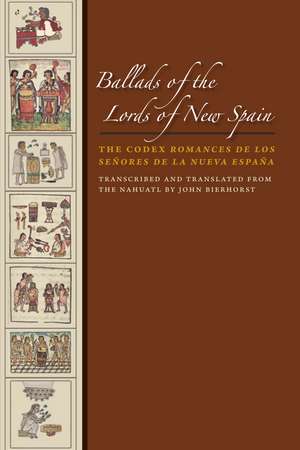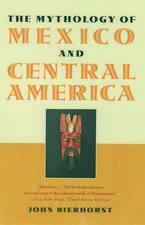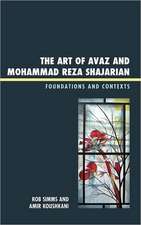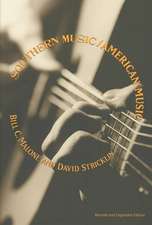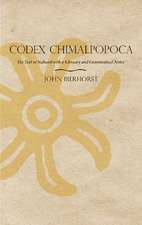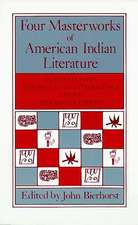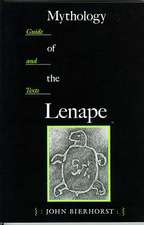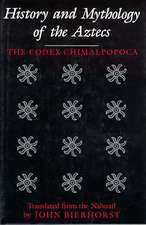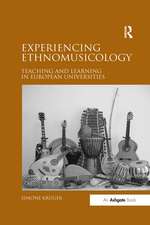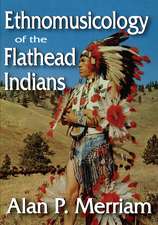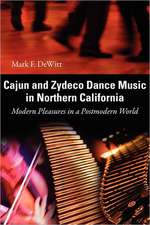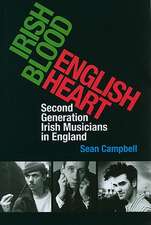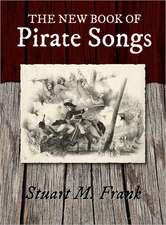Ballads of the Lords of New Spain: The Codex Romances de los Senores de la Nueva Espana
Autor John Bierhorsten Limba Engleză Paperback – iul 2009
This volume contains an exact transcription of the thirty-six Nahuatl song texts, accompanied by authoritative English translations. Bierhorst includes all the numerals (which give interpretive clues) in the Nahuatl texts and also differentiates the text from scribal glosses. His translations are thoroughly annotated to help readers understand the imagery and allusions in the texts. The volume also includes a helpful introduction and a larger essay, "On the Translation of Aztec Poetry," that discusses many relevant historical and literary issues.
In Bierhorst's expert translation and interpretation, Ballads of the Lords of New Spain emerges as a song of resistance by a conquered people and the recollection of a glorious past.
Preț: 160.51 lei
Nou
Puncte Express: 241
Preț estimativ în valută:
30.71€ • 32.13$ • 25.51£
30.71€ • 32.13$ • 25.51£
Carte disponibilă
Livrare economică 13-27 martie
Livrare express 26 februarie-04 martie pentru 28.68 lei
Preluare comenzi: 021 569.72.76
Specificații
ISBN-13: 9780292723450
ISBN-10: 0292723458
Pagini: 253
Dimensiuni: 152 x 229 x 19 mm
Greutate: 0.45 kg
Editura: University of Texas Press
Colecția University of Texas Press
ISBN-10: 0292723458
Pagini: 253
Dimensiuni: 152 x 229 x 19 mm
Greutate: 0.45 kg
Editura: University of Texas Press
Colecția University of Texas Press
Notă biografică
John Bierhorst is the author of thirty-five books on the Native literature of the Americas, including Cantares Mexicanos: Songs of the Aztecs; A Nahuatl-English Dictionary; History and Mythology of the Aztecs: The Codex Chimalpopoca; Mythology of the Lenape: Guide and Texts; and Latin American Folktales: Stories from Hispanic and Indian Traditions. He lives in West Shokan, New York.
Cuprins
- Preface
- A Note on Orthography
- Using the Online Edition
- Introduction
- On the Translation of Aztec Poetry
- Guide to the Vocabulary
- Romances de los Señores de la Nueva España/Ballads of the Lords of New Spain
- Guide to the Transcription
- The Text in Nahuatl and in English
- Part 1
- [I] 1. Friends, let us sing
- [II] 2. "I'm coming, I, Yoyontzin, craving flowers"
- [III] 3. Again they make music
- [IV] 4. God Self Maker's home is nowhere
- [V] 5. Friends, listen to this
- [VI] 6. "I come to guard the city"
- [VII] 7. The flower lords, the song bells
- [VIII] 8. Chalco's come to fight
- [IX] 9. Let's drink
- [X] 10. For a moment God's drums come forth
- [XI] 11. May your flesh, your hearts be leafy green
- [XII] 12. The flower trees are whirling
- [XIII] 13. In this flower house
- [XIV] 14. Princes, I've been hearing good songs
- Part 2
- [XV] 1. Now let us begin
- [XVI] 2. A master of egrets makes these flowers move
- [XVII] 3. On this flower mat you paint your songs
- [XVIII] 4. Are You obliging?
- [XIX] 5. I'm born in vain
- [XX] 6. I strike up a song
- [XXI] 7. I stand up the drum
- [XXII] 8. Your flowers blossom as bracelets
- [XXIII] 9. My heart is greatly wanting flowers
- [XXIV] 10. Let there be comrades
- [XXV] 11. Strike it up beautifully
- [XXVI] 12. Eagle flowers, broad leafy ones, are sprouting
- [XXVII] 13. A shield-roaring blaze-smoke rises up
- [XXVIII] 14. Flowers are our only adornment
- Part 3
- [XXIX] 1. [. . .]
- [XXIX-A] 1-A. You paint with flowers, with songs
- [XXX] 2. Your flowers are jade
- [XXXI] 3. Come forth and play our drum
- [XXXII] 4. In the house of pictures
- Part 4
- [XXXIII] 1. Begin in beauty
- [XXXIV] 2. Like flowers
- [XXXV] 3. "Never with shields"
- [XXXVI] 4. Jade, turquoise: your chalk, [your] plumes
- Commentary
- Concordance to Proper Nouns
- Verbs, Particles, and Common Nouns
- Appendix I: Two Versions of the Myth of the Origin of Music
- Appendix II: Corrections for the Cantares Edition
- Bibliography
- Index
Descriere
An authoritative transcription, translation, and commentary on a sixteenth-century Nahuatl codex that is one of only two principal sources of Aztec song and a key document in the study of Aztec life in the century after conquest.
